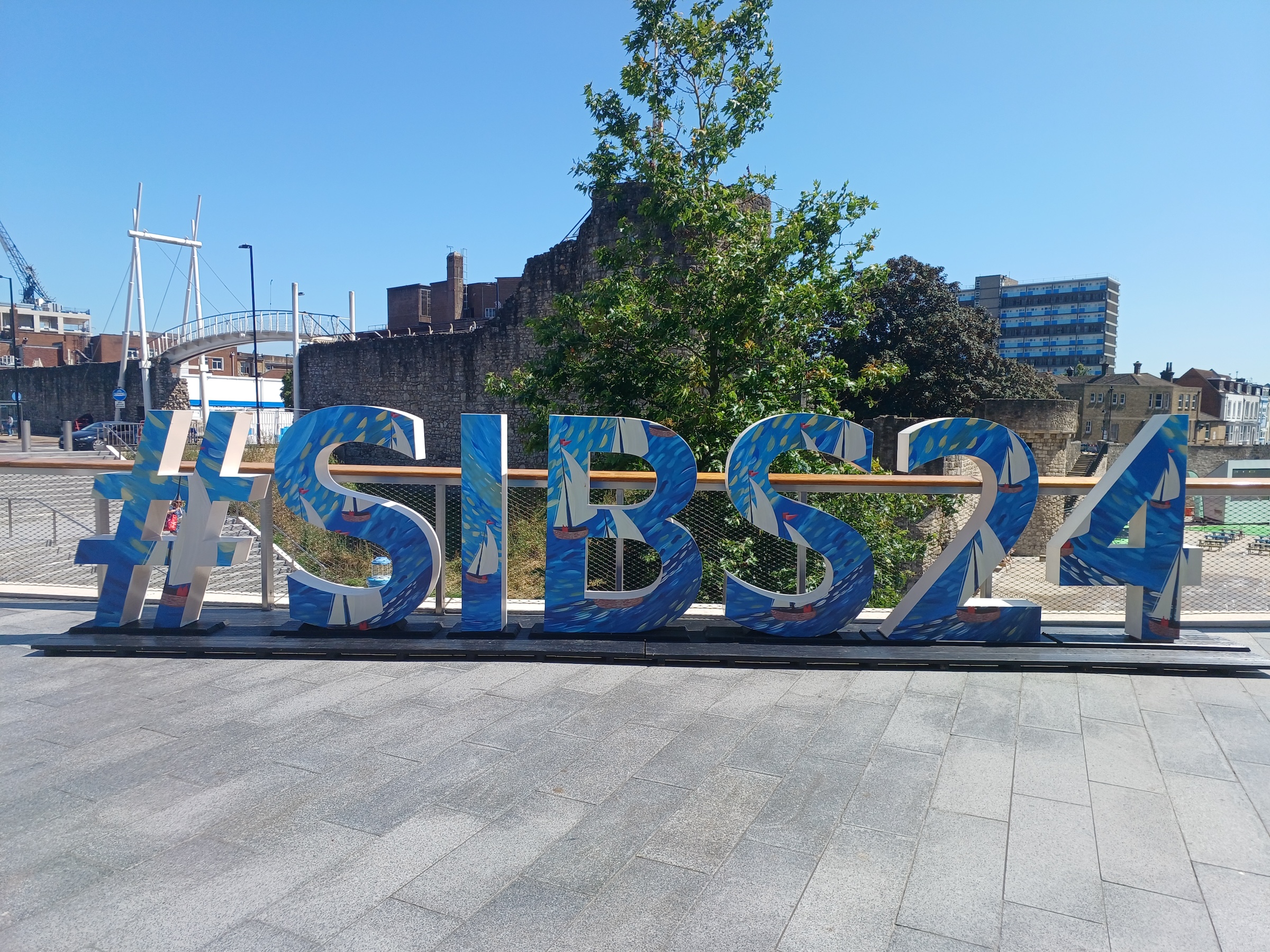A boat is one of the most exciting and expensive purchases you can make, and can undoubtedly be life enhancing. It will change the way you spend your leisure time, provide opportunities to have fun with family and friends and open up an abundance of new destinations to explore.
But, like a house purchase, this is a decision best not taken on a whim. Careful consideration and research is needed to make sure you opt for the type that will best suit your particular needs, and find a good model in sound order at the right price.
Then, once you think you’ve tracked down the boat for you, it’s time to bring in the professionals to ensure there aren’t any unseen problems and that the price is justified. A professional surveyor will thoroughly assess the boat’s condition and be well worth their fee, while a good broker will help ensure the transaction goes smoothly, deposits are handled correctly and all necessary paperwork is transferred promptly.
We’ve put together a step-by-step guide outlining the questions to ask, research to undertake and issues to consider before buying a boat.
Requirements
How will you use your boat?
With a remarkable array of boats on offer, from small sailing day boats to motorboats and comfortable long-distance cruisers, making a decision about what you want may take time. So, first and foremost, give careful consideration to how you will use it. While you may love the idea of taking a boat through the French canals and down to the Med or crossing the Atlantic to the Caribbean, be realistic. How much free time do you actually have? Will you be able to take months off work for an extended cruise or will you go out for day trips at weekends and the occasional evening? Do you think you will be able to take holidays on your boat, or will it mainly be used for shorter trips.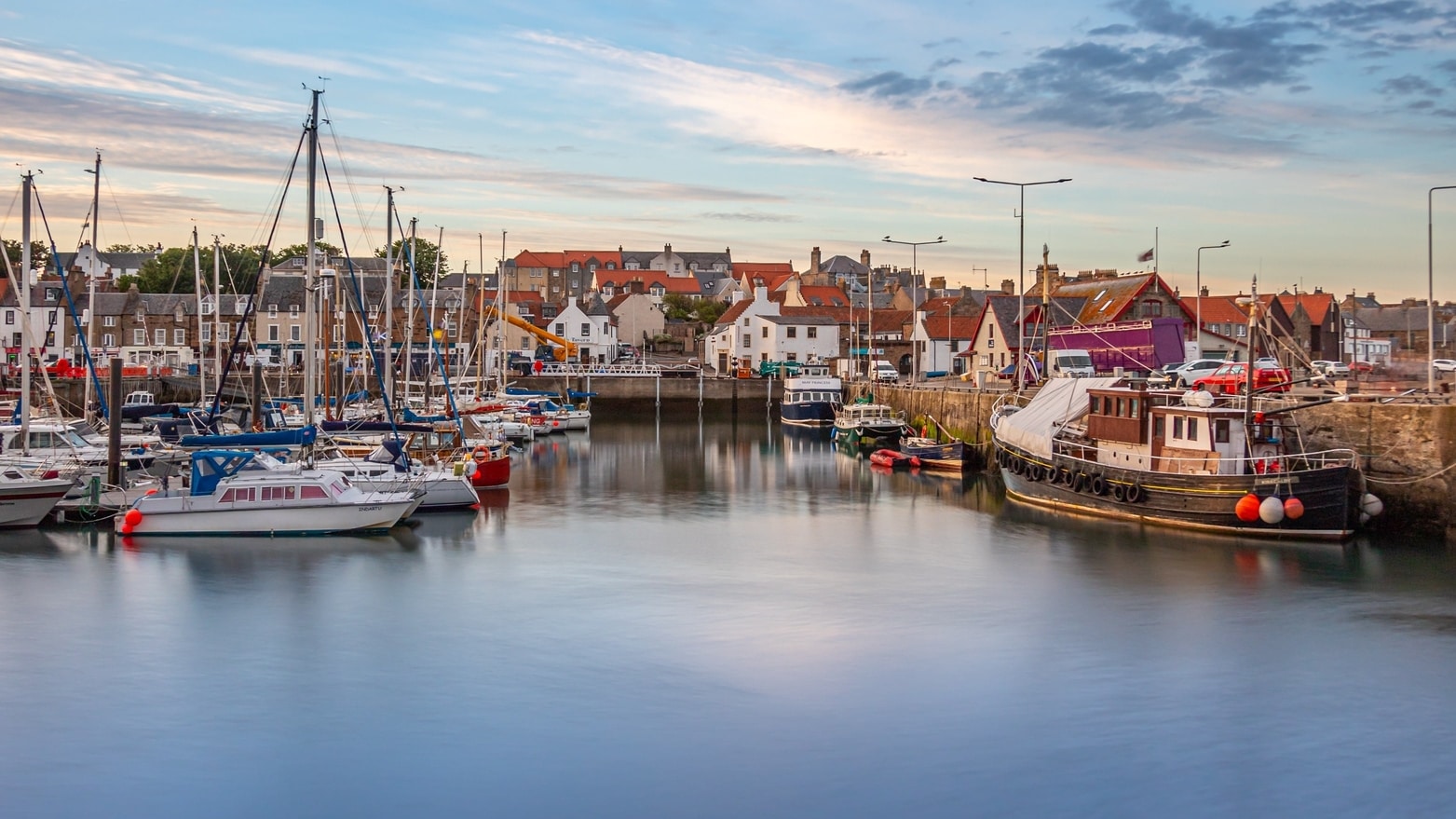 Would you like something that will allow you to get places quickly, to enjoy restaurants and bars ashore, or would you prefer to be able to anchor up in a pretty anchorage and put on the kettle before relaxing on board? Are you looking for a comfortable cruiser with space to stay or a basic runabout requiring minimal maintenance? Do you like the idea of travelling at a leisurely pace and enjoying the experience of being under sail, or with time at a premium is speed and power more important?
The makeup of your crew is another aspect to consider. If you’re likely to sail single-handed or with a partner without much experience, think about boats that are easy to handle and moor up alone. Although experienced old hands can handle sail boats single handed, it’s safer to do so with experienced crew and if those who you will be going out with aren’t that confident, a motorboat can be the easier option.
There may be a variety of different ways you see yourself using your boat, but it’s best to prioritise which are the most important before narrowing down the most suitable boat. For example, if you’d like to be able to tow wakeboards and inflatables for your kids but also take a leisurely sail – the conclusion may be that you need two different boats! But, if you decide that for the moment water sports and quick trips to different harbours are the top priority, you might choose to put off buying a sail boat until your children are older and opt for a RIB or sports boat now.
Would you like something that will allow you to get places quickly, to enjoy restaurants and bars ashore, or would you prefer to be able to anchor up in a pretty anchorage and put on the kettle before relaxing on board? Are you looking for a comfortable cruiser with space to stay or a basic runabout requiring minimal maintenance? Do you like the idea of travelling at a leisurely pace and enjoying the experience of being under sail, or with time at a premium is speed and power more important?
The makeup of your crew is another aspect to consider. If you’re likely to sail single-handed or with a partner without much experience, think about boats that are easy to handle and moor up alone. Although experienced old hands can handle sail boats single handed, it’s safer to do so with experienced crew and if those who you will be going out with aren’t that confident, a motorboat can be the easier option.
There may be a variety of different ways you see yourself using your boat, but it’s best to prioritise which are the most important before narrowing down the most suitable boat. For example, if you’d like to be able to tow wakeboards and inflatables for your kids but also take a leisurely sail – the conclusion may be that you need two different boats! But, if you decide that for the moment water sports and quick trips to different harbours are the top priority, you might choose to put off buying a sail boat until your children are older and opt for a RIB or sports boat now.
Every type of boat requires some maintenance, and how much you enjoy this type of work or have time for it may affect your final choice. Although it’s always possible to pay someone else to do it, the costs will quickly escalate if you go down that route, so make sure you understand the basic care a boat will require each year before you put in an offer.
Budget & Finance
When setting your budget think about how much you are prepared to spend annually as well as the initial layout. While a lovely old wooden boat may seem like a bargain, there is usually a reason. Cheaper older boats, especially wooden classics, will take more upkeep and significantly increase the costs in the long term. While a ready to go newer boat may seem expensive now, it may prove more cost effective in the longer term.
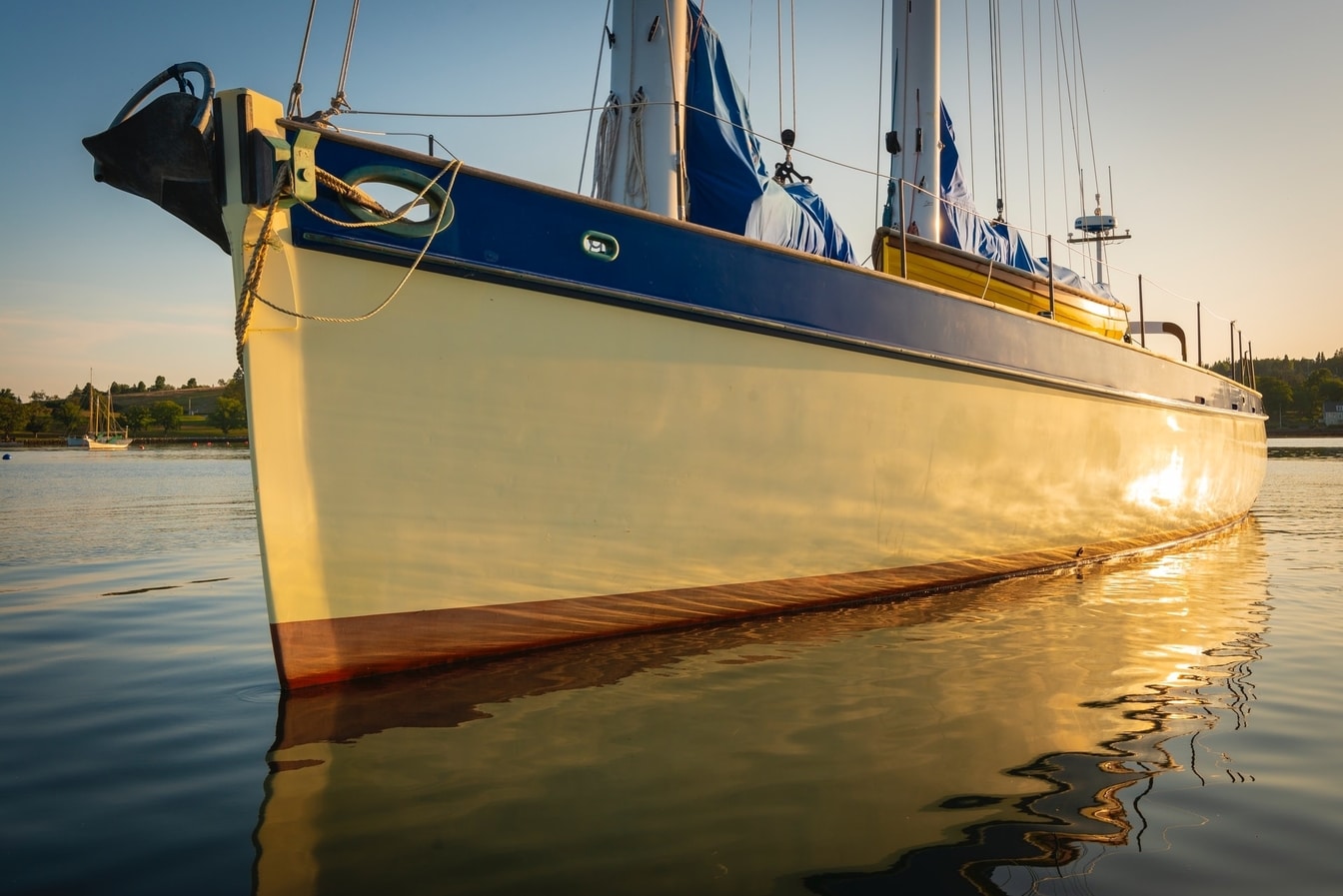
Remember that the bigger the boat you go for, the more it will cost to moor, lift out, store and insure. However, it’s a fine balance ̶ if you want this to be a long-term investment, you need to think about whether you may quickly outgrow a boat if you go too small. And don’t forget that while some easy-to-use motorboats may be cheap to buy, anything that moves at speed is likely to burn through fuel, potentially costing more in the long run.
If you’re planning to use a loan to help with your purchase, it’s a good idea to speak to some finance companies early on in your search. There are a number of different options available but marine mortgages tend to offer larger amounts and often lower rates than unsecured marine loans. But, if you fail to keep up the payments, the value of the loan can be recuperated by the lender by repossessing the boat. As boats usually depreciate in value, unlike a home, the interest rates are usually higher.
Another option is to take out a loan secured on your home rather than the boat, and this simplifies the process as the finance company or bank won’t need to be involved in the purchase of the boat. If you are buying a small boat of a low value and only need a couple of thousand, a personal or unsecured marine loan may be the simplest option to arrange. Whatever option you go for, get confirmation that you can borrow the amount you want on the terms you were expecting, before you go ahead and make an offer.
Marinas & Moorings
Where you will keep your boat is an important factor to consider, and may affect the type of vessel you choose. A marina berth is the most convenient and secure place to keep a boat, but this comes at a price.
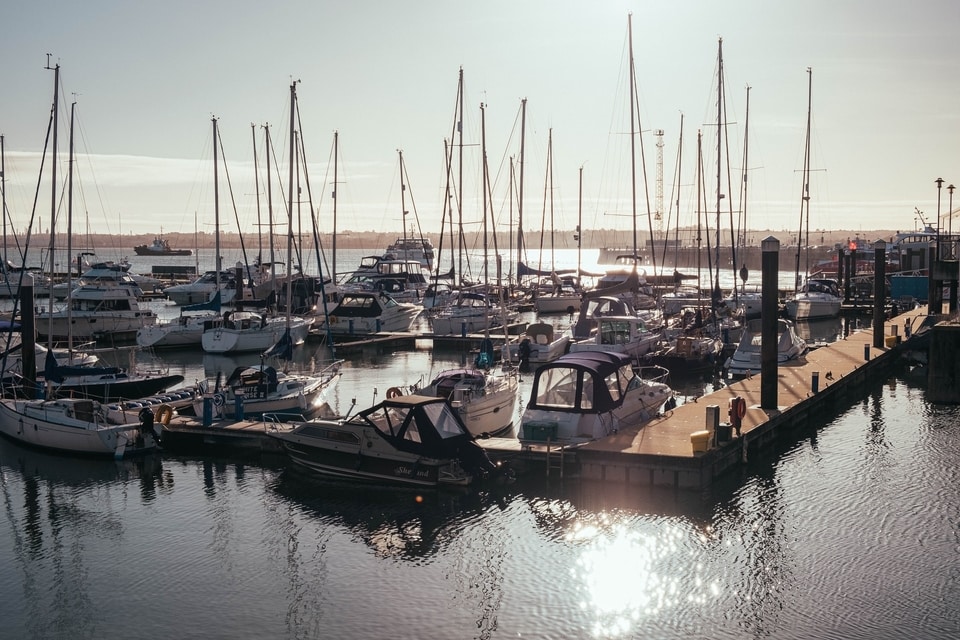
A yearly marina berth for a 10m boat is likely to cost upwards of £3,000 but may be substantially higher in the most popular south coast facilities. However, this does come with many benefits including quick and easy access to your boat at all states of the tide, on site parking, water and electricity. Other common benefits are 24-hour security, fuelling berths, toilets, showers and laundry facilities and on site boatyards, shops, restaurants and bars.
River moorings are more cost effective but, if you’re buying a sailboat, deep water moorings are often harder to get, and more expensive, making lift keel or bilge keel boats an attractive option for those wanting to get a mooring quickly.
If you’re thinking of buying a small boat, keeping it at home is obviously the cheapest option but comes with the hassle of getting it on and off the trailer each time, plus the need to find somewhere to park your car and trailer while you’re out on the water.
Some marinas have waiting lists, so be sure to give the marinas in your area a call before making an offer on a boat.
A breakdown of the main leisure boat types listed
Sailing Boats by Type: Photo by Emilie Crssrd
Blue Water Cruisers – Sailing yachts sturdy enough to take on long-distance voyages and offshore cruising.
Catamarans - Sailing boats with two parallel hulls.
Trimarans – Sailing boats with one main hull and two smaller outriggers or three hulls.
Classic Sailing Boats – Old or traditionally styled sailing vessels, often built of wood.
Cruisers – Sailing boats with accommodation, not built for racing.
Cutters – Sailing boats with two or more headsails.
Daysailers – Small sailing boats, larger and more substantial than a dinghy but without overnight accommodation.
Ketches – Sailing boats with a smaller secondary mast, known as the mizzen mast, towards the stern. Those with the mizzen mast right at the stern behind the rudder post are yawls rather than ketches.
Motor Sailers – While most sailing yachts have engines as a secondary source of propulsion, a motor sailer is as much a motorboat as a sailing boat – with a substantial engine and often smaller sails than would be expected in relation to the hull size.
Multihull Sailboats – Catamarans or trimarans
Racing Boats – A racing or performance yacht is built more for speed than comfort, although many can also be used for day sails or cruising. Some are built for fleet racing, to compete against identical models on a level playing field.
Sailing Dinghies – Small sailing boats, usually under 18ft, suitable for inshore sailing.
Schooners – Sailboats with two or more masts.
Sloops – Sail boats with one mast and usually a single headsail.
Trailer Sailers – Sailing boats that can be transported easily from place to place by trailer. Usually under 25ft.
Photo by Emilie Crssrd
Blue Water Cruisers – Sailing yachts sturdy enough to take on long-distance voyages and offshore cruising.
Catamarans - Sailing boats with two parallel hulls.
Trimarans – Sailing boats with one main hull and two smaller outriggers or three hulls.
Classic Sailing Boats – Old or traditionally styled sailing vessels, often built of wood.
Cruisers – Sailing boats with accommodation, not built for racing.
Cutters – Sailing boats with two or more headsails.
Daysailers – Small sailing boats, larger and more substantial than a dinghy but without overnight accommodation.
Ketches – Sailing boats with a smaller secondary mast, known as the mizzen mast, towards the stern. Those with the mizzen mast right at the stern behind the rudder post are yawls rather than ketches.
Motor Sailers – While most sailing yachts have engines as a secondary source of propulsion, a motor sailer is as much a motorboat as a sailing boat – with a substantial engine and often smaller sails than would be expected in relation to the hull size.
Multihull Sailboats – Catamarans or trimarans
Racing Boats – A racing or performance yacht is built more for speed than comfort, although many can also be used for day sails or cruising. Some are built for fleet racing, to compete against identical models on a level playing field.
Sailing Dinghies – Small sailing boats, usually under 18ft, suitable for inshore sailing.
Schooners – Sailboats with two or more masts.
Sloops – Sail boats with one mast and usually a single headsail.
Trailer Sailers – Sailing boats that can be transported easily from place to place by trailer. Usually under 25ft.
Motor Boats by Type:
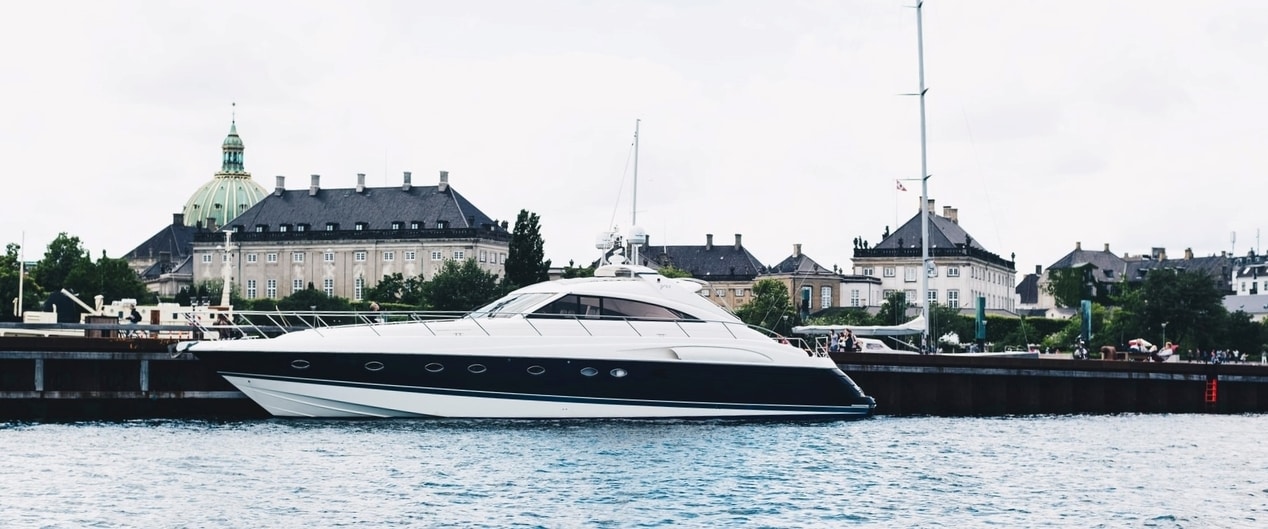
Photo by Markus Spiske
Aluminium Boats – Any boat built of aluminium, ranging from small open dories to much larger cruisers.
Barges – Long, shallow, flat-bottomed boats, usually for use on inland waterways and inshore waters.
Bowriders – Small, fast motorboats, usually under 35ft, with an open bow that is often used for seating.
Cabin Cruisers – Mid-sized motorboat with sleeping accommodation.
Canal and Narrowboats – Flat-bottomed boats used on canals and inland waterways, those 7ft wide or less are classified as narrowboats.
Catamarans – Boats with two hulls, often with a large saloon space which spreads the full width of the vessel.
Centre Consoles – Small open day boats, often powered by one or more outboards. Usually quite open plan and without accommodation.
Classic Motor Boats – Older or traditionally styled motorboats.
Cruisers – Mid to larger sized motorboats with on board accommodation suitable for coastal cruising and longer voyages.
Cuddy Boats – Small motorboats with a shelter or single cabin and sometimes a head.
Day Boats – Small open motorboats suitable for inland waterways and inshore waters, without overnight accommodation.
Fishing Boats – From small cuddy boats to professional trawlers, these boats usually have large deck space at the stern suitable for anglers and often a sturdy, enclosed pilot house.
Flybridges – Motorboats with a raised helm station on an upper deck, usually over 30ft long.
House Boats – A boat which is primarily used as a home and often kept in one place.
Inland Cruisers – Modern motorboats with accommodation used to cruise inland waterways.
Motor Yacht – A term to describe a motorboat that is generally over 40ft in length.
Multihull Motorboats – Motorboats with two or three hulls.
Offshore Cruisers – Mid-size to large motorboats of sturdy build, suitable for long-distance offshore cruising.
Speed Boats – Fast, planing motorboats, ranging from small open day boats to much larger vessels with or without accommodation.
Sports Cruisers – Fast planing motorboats with accommodation.
RIB – Rigid Inflatable Boat – A fast, planing boat with a solid base and inflatable tubes known as sponsons around the sides. Usually powered by one or more outboards, although some have inboard engines. The majority of RIBs are open but at the higher end of the market, models with small cabins are also available.
Gaining Experience
If you’re a newcomer to boating, it’s advisable to take a Royal Yachting Association (RYA) course prior to buying. Not only will you learn both the practical and navigation skills needed, you will be able to pick the instructor’s brains about boat types to suit you.

Photo by Alexander Andrews
And if you do have experience but want to try out some different types of boats, why not think about chartering? Weekend or short mid-week bookings are often available and a good selection can be found both within the UK and further afield. As well as traditional charter companies peer-to-peer rentals can be found through firms such as Borrow a Boat, Boat Afloat and Boataround which offer a range of rentals with or without a skipper.
RYA Courses
The Royal Yachting Association offer a comprehensive range of courses for anyone wanting to get afloat, whatever the type of vessel. These courses are run by sailing clubs and independent sailing schools throughout the country. Listed below are the main courses available. To find out about RYA accredited training in your area see: https://www.rya.org.uk/Pages/wheres-my-nearest.aspx/start
Inland waterway crew
Covering the basics of personal safety on board, handling mooring lines, helping operate locks and basic boat handling. Age 8 up.
Inland waterways helmsman
For those wanting to cruise inland waterways of UK and Europe, this two-day course covers the skills you need for helming a boat. assumes no prior knowledge. Age 12 up.
Yachting
Sailing courses in order: Start Yachting, Cruising Level 1 – Start Sailing, Competent Crew Practical, Cruising Level 2 – Practical Skills, Day Skipper Practical, Coastal Skipper Practical, Yachtmaster and Yachtmaster Offshore.
There’s a wide range of yachting courses available from Start Yachting, aimed at complete novices, moving on to Cruising Level 1 and then the Competent Crew Qualification. Further courses beyond Cruising Level 2 require knowledge of navigation.
There is no formal training course to complete to achieve the highly regarded RYA Yachtmaster™ Certificate of Competence. Many Yachtmaster™ candidates choose to book themselves into an RYA training centre for some tailor-made tuition to prepare them for the exam, but this is not compulsory.
RIBs and Powerboats
Level 1 and 2 Powerboat Handling, Powerboat Intermediate, Powerboat Advanced, Safety Boat Course.
Covering the basics of knowledge and skill needed to handle powerboats from level one up to advanced powerboating and a specialist course for drivers of escort and safety boats accompanying fleets of dinghy sailors or kayakers.
Motorboats
Start Motorcruising, Helmsman’s Practical, Day Skipper Practical Motor Cruising, Advanced Pilotage, Coastal Skipper Practical.
Aimed at those wanting to helm or crew larger motorboats and motorcruisers, the RYA motorboat courses commence with the basics in Start Motorcruising, leading on to basic helmsmanship skills followed by later courses which require some knowledge of navigation.
Navigation
Essential Navigation and Seamanship, Day Skipper Theory, Coastal Skipper/Yachtmaster Theory, Yachtmaster Ocean Theory.
A range of courses from basic to advanced, covering all aspects of traditional and electronic navigation, tidal awareness, pilotage, interpreting weather forecasts and safety. The Day Skipper theory course provides the skills needed to pilot a family boat by day in familiar waters, while Coastal Skipper/Yachtmaster Theory covers more complex knowledge and prepares sailors for taking charge during on night navigation and coastal voyages. Find them here.
Multihull
Multihull Sailing Levels 1-3, Multihull Seamanship, Multihull Day Sailing, Multihull Sailing with Spinnakers, Multihull Start Racing, Multihull Performance Sailing.
Specialist courses aimed at providing all necessary skills for handling catamarans and trimarans.
Keelboats
Keelboat sailing Levels 1-3, Keelboat Seamanship Skills, Keelboat Day Sailing, Keelboat Sailing with Spinnakers, Keelboat Start Racing, Keelboat Performance Sailing.
Specialist courses teaching all the skills necessary for handling and racing keelboats. For more information on these specialist courses click here.
Personal Watercraft
A one-day course which those who complete receive a proficiency certificate, required by some UK harbours and in many European countries to launch. All aspects of safe Jet Ski handling are covered.
Marine Radio Short Range Certificate
This Short Range Certificate is the minimum qualification required by law to use a VHF or VHF Digital Selective Calling (DSC) radio. As either a handheld or fixed radio is an essential piece of safety kit for any vessel going to sea, this short course is a must, see our blog on the DSC VHF Radio: What is it and what should I know?
Researching & enquiring
Once you’ve established a budget, decided on the type of boating you’ll be doing, and where you will keep it, it’s time to set about some research – and the more time you spend on this the better. Using a wide search on sites like BoatsandOutboards will show you a broad range of boats available within your budget in the size you are looking for.

At first it’s a good idea not to set distance parameters on your searches as, even if you aren’t prepared to travel to the opposite end of the country for a boat, it’s helpful to look at as wide a range of boats as possible to compare their condition, inventories and price. And, if you do find the ideal yacht is further away than you’d hoped, you may find professional boat transporters can bring a boat to you, either by road or water, for less than expected. When trawling through the boats that searches bring up, be sure to have a good look at their full inventories to see what equipment to expect and have a good look at the different types of layout often available on the same model of boat.
While online sites are the best source of finding which boats are for sale, first-hand advice is also invaluable when it comes to deciding the type to suit you. If you’re already a member of a club, ask around to see if there are other members with the type of boats you’ve been considering. They will be able to tell you the good and bad points of their boat, potential problems to look out for and may even know others with that model of boat for sale. Even if you’re not a club member, it’s still worth calling in to find out about joining a local club or asking at the office if there are any members you could speak to.
If you have a good broker near you, pop into their office for a chat as most are extremely knowledgeable about a wide range of boats and will be happy to give you some advice and suggest models of boats you may not have considered.
A quick online search will also bring up an owners’ club for many well established boat brands. They are often happy to give advice and may have interesting discussion forums and boats for sale pages.
Finally boat tests in magazines, such as Yachting Monthly, Practical Boat Owner, Motor Boat and Yachting, Sailing Today and Yachts & Yachting, are another invaluable source of information ̶ providing an expert’s opinion of how the boat performs as well as issues to look out for. The majority of these can be read online and some magazines also produce video boat tests. None are as slick as the American site, BoatTEST.com, which provides extremely comprehensive reviews covering details down to the measurement of lockers.
Viewings & Surveys
When arranging to see a boat for sale through a broker, check they are a member of the Association of Brokers and Yacht Agents (ABYA). A good broker will make the viewing process straightforward and should be able to tell you about the boat’s history and the owner’s reasons for selling. Take your time to look round and thoroughly inspect the boat’s equipment, and don’t let yourself be rushed into making an offer on the spot.
Find out how long the boat has been on the market and sound out the broker about flexibility on the price. At the same time ask if they have any similar models on their books they think you should consider. Some firms are part of a network and may have heard of other boats about to come on the market or may be advise on other boats they think would suit you better.
When viewing a boat that’s being sold privately, ask to see all essential paperwork and discuss the owner’s reasons for selling. Make sure you know exactly what is included in the sale and find out how much of the maintenance has been done by them and how well cared for it seems to be. Try to sound out how knowledgeable the owner is and how they have cared for the boat. Has the engine been professionally serviced? Have the sails been properly cared for and stored each winter?
Look out for these key areas and problems on initial inspection when viewing a used boat. Read the guide.
Following an initial inspection, if you are serious, ask about arranging a sea trial. Any costs incurred by this, such as fuel and launching fees if out of the water, will be charged to you. But it is well worth the outlay to really get to know how the boat will handle and whether it will suit your needs when out on the water.
With this in mind, it’s a good idea to trial the boat with the person or people who will usually make up your crew. See how easy it is to move around, reach into lockers, access mooring cleats etc and get their views on how the boat handles too.
At the same time, think about everything you will want on board and whether there is sufficient storage to meet your needs. Consider the regular maintenance tasks and whether the boat’s design will make these easy to perform e.g. within the engine compartment, are the fuel filters easy to reach?
If all looks good and you make an offer, it should be made clear this is subject to survey. Ensure the surveyor you hire to carry this out is a member of the Yacht Designers and Surveyors Association (YDSA) or the International Institute of Marine Surveying (IIMS), and that the boat is brought out of the water to be properly assessed.
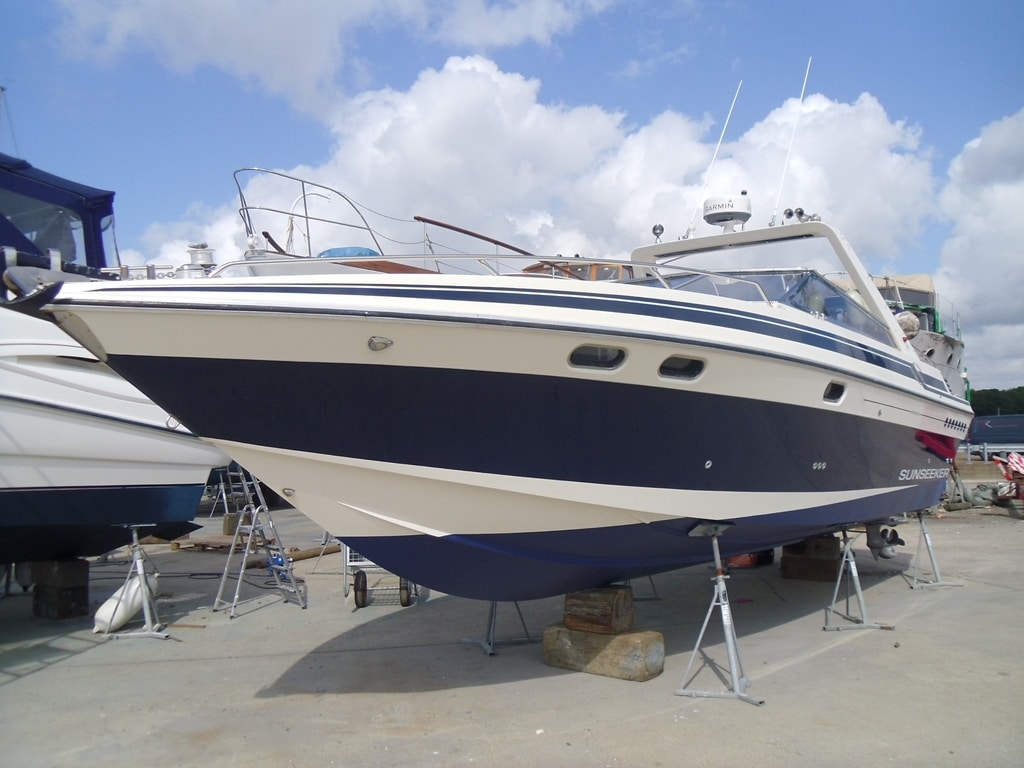
Photo by Anchor House Marine Surveys
For those buying classic boats or those built of ferro-cement, it can be worth looking for a surveyor with particular expertise in those fields. Some insurers can be wary of providing cover for ferro-cement boats so a survey by a specialist will help secure this.
A good surveyor will inspect all aspects of the boat thoroughly and provide a detailed report, highlighting any faults and outlining any work needed and its likely cost. This will in turn help you renegotiate the price if there are any substantial issues to be addressed or may guide you towards reconsidering the purchase altogether, saving you in the long run.
See our pre-purchase article for what to look for before buying- a conversation with Rupert Keyzar, from Anchor House Marine Surveys.
Legal requirements & paperwork
On purchasing the boat you should be given a bill of sale, as this will be your proof of ownership and may be required to obtain insurance, as well as previous bills of sale that relate to the vessel. In addition, you should receive proof that the VAT has been paid, such as the original invoice, evidence of RCD (Recreational Craft Directive) compliance and ideally a builder’s certificate. On top of this you should also ask for paperwork relating to servicing, any previous bills for large repairs, warranties on any equipment included in the sale and the owner’s manual.

Any reputable broker will deal with all of this for you, as well as arrange for a full inventory to be agreed prior to the sale. Many lower end boats will be sold privately and buyers will need to make sure they ask for all the relevant documentation and make a clear agreement on exactly what will be included in the purchase. Be wary if they can’t supply evidence of RCD compliance, VAT payment or a previous sale. When it comes to sell this boat on, you will have difficulty if you can’t provide the necessary paperwork and a boat without documentation flags up concern that it may be stolen.
Registration, Licences & Tuition
You are not legally required to register a leisure boat kept in UK waters. However, many choose to do so and if you are planning to take it abroad you must. Completing Part 3 of the Central Register of British Ships is sufficient to undertake short cruises abroad. Known as the Small Ships Register (SSR) this form of registration provides evidence of nationality to demonstrate which flag state has responsibility for the vessel when voyaging outside UK territorial waters. It’s the cheapest option for short trips away from the UK.
Alternatively, you can opt for Part 1 registration. As well as nationality it provides evidence of ownership and confers a unique name and registration number (Official Number). Part 1 registration will be required if you are taking out a marine mortgage. Those intending to take their boat away from the UK for extended periods of time should register it on Part 1 before departing.
VHF licence
Shortwave radio communication is a basic safety requirement for all coastal and offshore boats which cannot rely on mobile reception to communicate. These require a Ship Radio Licence and a radio operator certificate which requires basic training to complete. Ship Radio Licences are issued by Ofcom while operator’s qualifications can be gained through the RYA.
EPIRBs & PLBs
If you own a Personal Locator Beacon or Emergency Position Indicating Radio Beacon there’s a legal requirement to register it, although the RYA reports there are around 40,000 in the UK which aren’t. The emergency services will have a better chance of finding you if they know what sort of craft they are looking for when an alarm sounds, as well as who to contact, so it is sensible to do so. To complete this registration visit:


